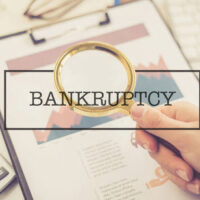Understanding the Life Cycle of Your Debt

If you are in debt and are considering bankruptcy, you may be wondering where all the phone calls and letters trying to collect your debts are coming from. They seemingly come from different companies with strange names that you’ve never heard of. That’s because of how complex the life of your debt can get.
The Original Creditor
Your debt starts with the original creditor—the company that you charged the debt with. That may be a large retailer, like Target, Best Buy or Walmart, with a card that is backed by a traditional credit card-issuing bank.
The problem is that original creditors are not in the business of collecting debt. That’s not their business model. They also don’t want the negative public relations that come with being associated with debt collection and with harassing their consumers. That means they have to bring in debt collectors to collect money owed to them.
Debt Collectors
Your original creditor will contract with the debt collector to help it collect the money that you owe. The collection agency or debt collector will usually get a fee, in the form of a percentage, of the money it can collect from you.
However, although the collection agency is collecting, the original creditor still owns the debt. That means that the collection agency can only approve any settlement or payment plan that the original creditor approves of. It also means that the collection agency has limited ability to lower the amount owed.
If the collection agency cannot collect the debt, the debt may be sent to a second, or third collection agency. Yet, the original creditor still owns the debt.
Debt Buyers
When debt gets old enough, and the original creditor sees it as potentially uncollectible, it will sell the debt, in bulk with other people’s accounts, to a debt buyer. The debt buyer will purchase thousands of accounts that have not been paid, for pennies on the dollar. For example, the debt buyer may buy $1 million of owed, unpaid debt for $200,000.
That means three things, which are important to consumers:
- Because the debt buyer has paid pennies on the dollar, it can offer more aggressive and favorable settlements to consumers
- The debt buyer owns the debt, and does not need approval from the original creditor to settle an account. It can approve of settlements and work out payment plans however it would like.
- Again because the debt buyer owns the debt, the buyer has the right to sue for the amount owed. Many debt buyers do sue consumers, whereas collection agencies, which are just working for the original creditor, will not.
One common problem debt buyers have is that they sometimes do not have all the paperwork to document the debt from the original creditor. Their documentation may be incomplete or completely unavailable. This makes it easier for a consumer to fight debt collection lawsuits in court.
Do you have debt that you would like to discharge in bankruptcy? Call the West Palm Beach bankruptcy lawyers at Kelley Kaplan & Eller at 561-264-6850 for help.
Resource:
investopedia.com/articles/personal-finance/121514/how-debt-collection-agency-business-works.asp



